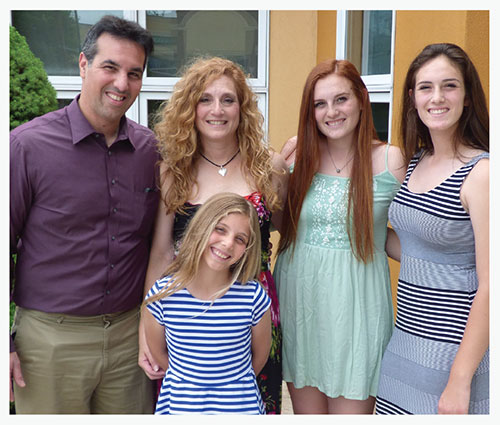Bladder Cancer Survivor
Baby Steps Lead Survivor Through Cancer Journey
 Dana Caparoso was just 43 years old when she saw the first sign of her bladder cancer: blood in her urine. She thought it was strange so she asked her gynecologist about it. Blood tests and a pelvic ultrasound showed nothing abnormal, so it was attributed to perimenopause. She knew something wasn’t right though and pursued further explanation.
Dana Caparoso was just 43 years old when she saw the first sign of her bladder cancer: blood in her urine. She thought it was strange so she asked her gynecologist about it. Blood tests and a pelvic ultrasound showed nothing abnormal, so it was attributed to perimenopause. She knew something wasn’t right though and pursued further explanation.
After the first round of tests, additional symptoms began to surface: blood on the tissue after going to the bathroom, a feeling of pressure in my bladder without ever being able to fully empty it and lower back pain. I was told it was likely a urinary tract infection or back pain from ovulation – nothing to worry about. But the symptoms persisted, and eventually I went to my primary care physician, who recommended I see a urologist. My first thought was that a urologist is a doctor for my husband, not me. I soon learned that was a misconception. When I went, he performed a urine test and ordered a CT scan. I received a call that evening letting me know I needed to come back the next day. He told me there was a tumor in my bladder and I began to cry. All I could think about was, “What about my children?”
I was in complete denial. I even asked my husband not to tell anyone and we waited to tell our children. I decided to pursue a second opinion and the physician performed a cystoscopy in her office. She even showed me the tumor on the screen. I made an appointment for later that week and went in thinking it was to have the tumor removed. However, as I sat on the operating table, my doctor told me she was only doing a biopsy. The results showed that I had Stage TIIIB bladder cancer that had gone through the fatty layer of my bladder but had not spread any further. One week later, I met with the oncologist who told me I needed to start chemotherapy to shrink the tumor. I started four rounds of combination chemotherapy. I was tired, a little nauseous and water tasted like metal. Although it was an adjustment, I was thankful the physical side effects weren’t severe.
Emotionally, it was a bit more difficult. Telling my kids was one of the hardest things I’ve ever done. But I sat them down and explained that I was going to fight so that I could be there for them. My husband and my girls became my inspiration and a line from "The Shawshank Redemption" became suddenly fitting: “Get busy living, or get busy dying.” And I was not done living yet.
About eight weeks after chemo, I had surgery: a radical cystectomy to remove my bladder, a hysterectomy and an oophorectomy – basically any organs where the cancer might spread were removed. To replace my bladder, the surgeon used a part of my colon and intestine to create an internal pouch, called an Indiana pouch. It took about a month to heal and then it took time for the pouch to expand.
My new normal became using a catheter to empty my bladder through a stoma in my belly button. At first, everywhere we went it became about scouting bathrooms, and I was catheterizing myself every half hour. I did occasionally have leaks from my stoma, but as a former breastfeeding mother, I realized I could use nursing pads to absorb the leakage. For me, they were the perfect size and pretty absorbent. And I always brought a change of clothes, just in case.
Eventually, I developed a pattern and would catheterize whenever I felt a sense of fullness or at two hours, whichever came first. Over time, I was able to hold it longer and longer. Now, I can go four to six hours, and my daily life is as active as ever. I swim and exercise regularly and even play goalie for a recreational soccer team.
In the beginning of my journey, there was fear and self-pity. I asked myself, “Why me?” I came to realize though, “Why not me?” God only gives you what you can handle and although I was absolutely shocked, I knew that I could and that I would get through it. About a month after my surgery, my family and I decided to go on a trip together – my goal was to live my life again and it was about time I started!
A short time after treatment, I decided I wanted to share my story with other women, especially those who may have been misdiagnosed or whose cancer was missed completely. When I reached out, I was introduced to the Bladder Cancer Advocacy Network (BCAN). Their team inspired me and made me truly realize that we are not alone and just how helpful the exchange of information can be. Knowledge is truly powerful. Treatments may not have changed in 20 years, but everyone’s experiences are different and talking about them with other survivors offers invaluable insight into your personal fight against this disease. Do what you have to do to find out what works for you and don’t give up. It gets better, it really does – and every baby step gets easier.


